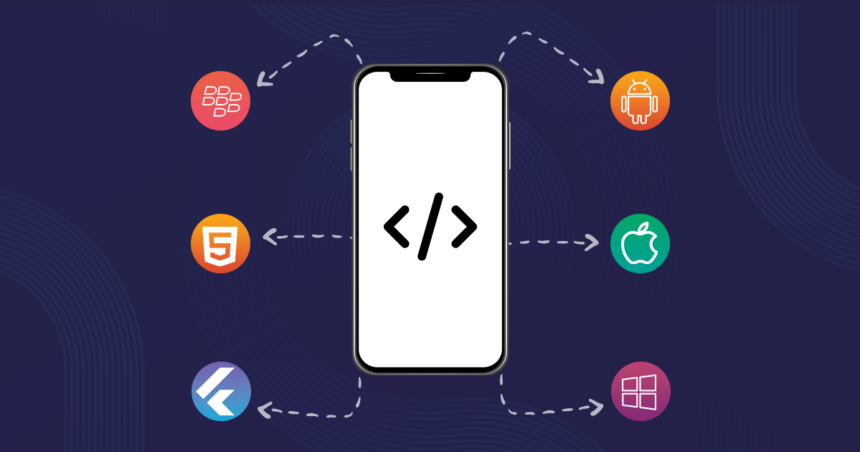According to the 2024 plan of utilizing the apps to drive the achievement of business objectives, the selection of an app development framework is crucial. Flutter appears when companies have to meet the challenge of getting to users on multiple devices and systems. Flutter was developed by Google, it offers a unique model in development where a single source code can be used to create both iOS & android applications which not only saves a lot of money and time but doesn’t compromise on the quality. Cross-platform app development services are expected to rise significantly, and many companies and developers decided to use Flutter for its versatility, active community, and opportunity to create applications using powerful instruments that save time and effort.
As for now, dancers have embraced Flutter, with over 3.3 million apps out already, thanks to the Flutter developer base and Google’s promise of constant upgrades. It is crucial to know what Flutter offers and why so many businesses are turning to cross-platform app development services if your business is thinking about it.
Top 5 Benefits of Flutter for Cross-Platform Development
1.Single Code with Multiple Interface
Flutter’s system of having only one set of codes to build both iOS and Android cut the time and cost of development in half.
2.Native Performance and Feel
Flutter positions it in between cross-platform app development services and native with a great interface quality for animations.
3.Customizable Widgets
The Fundamental element in the Flutter framework is a widget where we have the opportunity to create adaptive UIs for any device.
4.Faster Development Cycles
With the aid of “hot reload,” it becomes possible to make changes constantly, and that saves time for testing and debugging.
5.Proper Social Relations and Ecosystem
Flutter is well-known and has a powerful community and a large selection of widgets that can be used to greatly decrease the work necessary.
Differences Between Flutter and Other Cross-Platform Frameworks
1.Programming Language (Dart)
Unlike React Native where you work with JavaScript based, Flutter is developed using Dart. The thing is that Dart’s compilation helps to improve performance and avoid any lags in the applications.
2.Performance
As it operates on material, flutter targets the native ARM code which makes Flutter apps faster than other similar frameworks.
3.UI Consistency
As we have already discussed, Flutter uses widgets and it became easier to maintain the look and feel of the apps.
4.Native Features Accessible
Flutter adapts to platform natural features seamlessly while with other frameworks one needs to go for extra hacks.
5.Community and Google Support
Flutter is a more reliable long-term tool for development due to Google’s signature and consistent updates as well as a stable detailed plan of further updates.
Best Development Approaches for Flutter App Development
1.Unified Code Base
With Unified Code Base, you can develop an application for one platform and run it on all other platforms too. Develop code only once, deploy across both iOS and Android, both web and desktop and save development manpower heavily.
2.Widget Customization for Unique Interfaces
Flutter’s immense widget catalog backs bespoke UI parts that make your app visually distinct on both side-by-side platforms.
3.API Integration
Flutter supports third-party API integration easily which should open functionalities as per business requirements.
4.Meant for Testing or Debugging with Hot Reload
With Flutter, hot reload allows developers to locate bugs and apply solutions within no time hence increasing efficiency.
5.Automated Testing Tools
Flutter has testing solutions for phases such as unit, widget, and integration, and this makes for a good user interface.
Top Reasons to Choose Flutter for Business Applications
- Cost Efficiency
Since it is deployed using a single codebase, it can save a lot of time and money compared to other methods using a lot of resources for startups and SMEs.
- Same High Performance across all Media.
Flutter has good compatibility with both iOS and Android platforms; this makes it possible for customers to be satisfied across the two devices.
- Customization Flexibility
Through widget customization, great extent business enterprises can develop tailored, effective, and appealing interfaces that embody the businesses’ brands.
- Scalability and Reliability
The FLUTTER platform’s compatibility with multiple operating systems and devices enables businesses to upscale their products as users increase.
- Future-Readiness
An important feature of Google is frequent releases and additions, which makes Flutter a perfect solution for companies that want to be relevant in the future.
Business Use case that can be developed using Flutter
- E-commerce Applications
Due to its overwhelming performance and smooth Interfaces, Flutter is suitable for e-commerce applications where excellent navigation is required.
- On-Demand Service Platforms
Thus, Flutter entails cross-platform support for on-demand food delivery and ride-hailing quick application development.
- Finance and Banking Apps
Due to secured ways of managing data, Flutter can be advisable for finance applications where it is crucial to prevent cheating.
- Social Media Platforms
This flexibility enables the creation of immersive and exclusive UIs in social grooming and communication apps to support enriched modes of user engagement.
- Healthcare Applications
Applications like healthcare apps that need to track data in real-time benefit from Flutter’s singular code sharing and creating data integration possibilities across devices.
Does Flutter Suit Your Business If yes, What Factors Are There to Consider?
Flutter is a powerful tool for cross-platform app development businesses that strive, to reach users on as many platforms as possible. If you are going to cooperate with a Flutter app development company or use it in-house, the integrated model offers development benefits, a high level of performance, and the use of first-level tools. For organizations that want to create a stable app while minimizing expenses, with limited resources, the choice is still Flutter.
With these advantages in mind, does Flutter fit your company’s goals for 2024? Is it the right choice to bring your app ideas to life across platforms?






